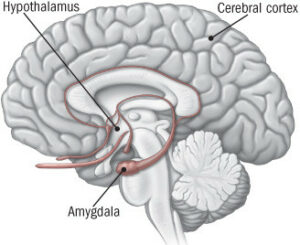Posttraumatic stress disorder, or PTSD, is a condition that can develop after someone has experienced a traumatic event. While there are many treatments available for PTSD, some people prefer to explore more natural options. Cortisol treatments have shown promise in helping to manage symptoms of PTSD. In this blog post, we will discuss cortisol treatments and how they may help manage PTSD symptoms.
Contents
Can PTSD Cause High Cortisol Levels?
 Yes, PTSD can cause elevated cortisol levels. Cortisol is a hormone released by the body in response to stress and anxiety. People with PTSD experience chronic emotional distress that can lead to higher-than-normal levels of cortisol production. This can have a range of physical and psychological effects, such as weight gain, difficulty sleeping, fatigue, irritability, and poor concentration.
Yes, PTSD can cause elevated cortisol levels. Cortisol is a hormone released by the body in response to stress and anxiety. People with PTSD experience chronic emotional distress that can lead to higher-than-normal levels of cortisol production. This can have a range of physical and psychological effects, such as weight gain, difficulty sleeping, fatigue, irritability, and poor concentration.
Researchers have found 60% higher cortisol levels in people with PTSD than in those without the condition. For this reason, it is important to understand how PTSD might be impacting your cortisol levels and how to address it appropriately.
Over time, elevated cortisol levels can weaken the body’s immune system, leaving a person more vulnerable to disease. Additionally, long-term exposure to high cortisol levels has been linked to an increased risk of serious health conditions. Such as cardiovascular disease and diabetes.
Fortunately, there are a number of PTSD cortisol treatments that can help counteract the effects of cortisol on the body. Be sure to discuss your options with a mental health professional, as they can help you find an effective treatment plan.
What Are Some Natural PTSD Cortisol Treatments?
When you or someone close to you is dealing with post-traumatic stress disorder (PTSD), it can be difficult to know how best to help. Fortunately, there are a few ways to manage the levels of cortisol. So, here are the top 10 PTSD cortisol treatments for you:
Deep Breathing Exercises
Practicing deep breathing can help naturally calm the body and reduce cortisol levels. It’s best to practice several times a day, for at least five minutes each time. You can also practice breathing exercises while doing yoga or tai chi. This is believed to help with relaxation and reduce stress.
Regular Exercise
Exercise is known to release endorphins and provide a calming effect on the body, which can help reduce cortisol levels. Even moderate activities such as walking or yoga can be beneficial. In fact, you can even try activities such as martial arts or boxing, which can help with emotional regulation. As this works, it can help to reduce cortisol levels in those with PTSD.
Meditation
Much like deep breathing exercises, meditation can help relax the body and reduce cortisol levels. Taking a few moments each day to sit quietly and focus on your breath or a mantra can have an overall calming effect on your mental state. Many people have found that this can help to naturally reduce cortisol levels over time. Even if you don’t have a lot of time to dedicate to it, even just 10 minutes can help.
Healthy Diet
Eating a healthy diet is important for many reasons, including its ability to reduce stress hormones like cortisol. Eating a balanced diet can help reduce the body’s stress response and aid in restoring balance to the body. This can be done by avoiding processed foods and opting for more fresh and natural items. Additionally, make sure to stay hydrated throughout the day.
Get Enough Sleep
Sleep is essential for maintaining healthy cortisol levels. Not getting enough sleep can increase stress hormones, resulting in higher levels of cortisol throughout the day. To ensure you get enough restful sleep each night, be sure to develop a healthy sleep routine. It is an important part of managing stress and reducing cortisol levels.
Aromatherapy
Certain essential oils, such as lavender and chamomile, can help reduce cortisol levels when used during aromatherapy. Simply inhale the oil or add a few drops of it to your bathwater each night for a calming effect before bedtime. And other days, if you’re feeling stressed, take a few minutes to breathe in the aroma for calming effects.
Acupuncture
Studies suggest that acupuncture can help to regulate cortisol levels. This is done by stimulating certain points in the body that are believed to have a calming effect on the nervous system. It is a type of traditional Chinese medicine that can help to reduce cortisol levels. And many people have found it to be beneficial in managing their PTSD.
Yoga
Practicing yoga regularly can help reduce cortisol levels and improve overall health, both mentally and physically. Focusing on your breath during each pose helps you stay mindful of the present moment rather than worrying about the past or future. In fact, there are some specific yoga poses that are believed to be particularly beneficial for those dealing with PTSD an
Massage
Regular massage can be a great way to reduce cortisol levels and relax the body. It has been known to help with stress management and improve overall well-being. There are different types of massage, such as Swedish and deep tissue, that can help to reduce cortisol levels. So it’s important to find one that works best for you.
Herbs And Supplements
 Finally, some people have found relief from their PTSD symptoms by taking certain herbs and supplements. One of the most commonly used is ashwagandha, which has been shown to reduce cortisol levels and improve overall mental health. Other options include holy basil, lemon balm, passionflower, and kava.
Finally, some people have found relief from their PTSD symptoms by taking certain herbs and supplements. One of the most commonly used is ashwagandha, which has been shown to reduce cortisol levels and improve overall mental health. Other options include holy basil, lemon balm, passionflower, and kava.
These are just some of the many natural PTSD cortisol treatments available. Always consult with your doctor before starting any new treatment or medication, especially when it comes to supplements. With the right treatment plan, you can reduce your cortisol levels and manage your PTSD symptoms.
When Should I Take Medication For Managing Cortisol Levels?
Generally speaking, medications should not be taken as a first line of treatment for managing cortisol levels. If lifestyle interventions have already been attempted and failed to provide relief, then medication may be considered. However, the decision to start or continue taking any medication should always be discussed with a healthcare provider.
Depending on the individual’s health condition and needs, medications may include:
- antidepressants
- anti-anxiety agents
- diuretics to help reduce fluid retention
It is important to keep in mind that medications can have side effects and may interact with other medications or supplements. So it is important to discuss all potential risks and benefits with a healthcare provider before starting any new treatment. Furthermore, the effectiveness of certain medications for managing cortisol levels may vary from person to person.
Regular monitoring of cortisol levels is recommended to ensure that the medication is providing the desired effect. If a medication is not providing relief, then other treatment options may be explored.
Does Cortisol Cause Permanent Damage?
 PTSD and long-term, chronic stress can lead to higher-than-normal levels of cortisol in the body. While some research suggests that long-term exposure to cortisol can have negative effects on various parts of the body, including brain functioning, it is not clear whether this damage is permanent.
PTSD and long-term, chronic stress can lead to higher-than-normal levels of cortisol in the body. While some research suggests that long-term exposure to cortisol can have negative effects on various parts of the body, including brain functioning, it is not clear whether this damage is permanent.
The most common symptoms associated with PTSD cortisol levels are:
- sleeplessness
- poor concentration
- memory issues
- general fatigue
It is possible that these symptoms could become permanent if the person continues to experience high cortisol levels for an extended period of time. So, do not wait for the signs to become permanent, and seek medical help when you experience any of these symptoms.
Research also suggests that stress-related cortisol levels may have negative effects on a person’s physical health, such as an increased risk of cardiovascular disease, stroke, and obesity. Thus, take care to reduce your stress levels and seek professional help if needed.
Conclusion
To conclude, PTSD cortisol treatments are necessary for those suffering from the disorder. The treatments can help to reduce symptoms, improve quality of life and even potentially cure PTSD. It is important to remember that these treatments should be used in conjunction with psychotherapy, counseling, and other forms of supportive care.
When considering any type of treatment for PTSD it is important to speak with a mental health professional who can provide an accurate diagnosis. And help you decide which treatment option is best for you.
For more information, please contact MantraCare. PTSD or Post-Traumatic Stress Disorder is a mental health condition that affects people who have experienced or witnessed a traumatic event. If you have any queries regarding Online PTSD Counseling experienced therapists at MantraCare can help: Book a trial PTSD therapy session


